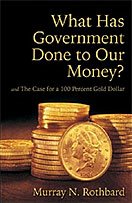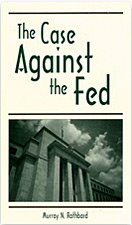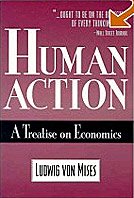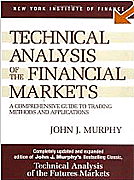Hugo Salinas Price: A perpetual 'war on gold'?
Hugo Salinas Price, president of the Mexican Civic Association for Silver and longtime friend and supporter of GATA, speculates in a new essay, "A Perpetual 'War on Gold'?," about how governments could keep their gold-price suppression scheme going even after their gold reserves are exhausted.
It's by surreptitiously acquiring major gold producers and operating them at a loss, which would be very small by government and general market standards and easily could be hidden by the government. (The U.S. government and a major Canadian mining company may have thought this one up first.)
Salinas Price's essay is a bit of a downer but in this business it's better to get and stay down than to stand up with a big smile on your face, wide open for the next central bank intervention.
It's by surreptitiously acquiring major gold producers and operating them at a loss, which would be very small by government and general market standards and easily could be hidden by the government. (The U.S. government and a major Canadian mining company may have thought this one up first.)
Salinas Price's essay is a bit of a downer but in this business it's better to get and stay down than to stand up with a big smile on your face, wide open for the next central bank intervention.
A perpetual 'war on gold'?
Originally posted at http://www.plata.com.mx/plata/ on September 15th, 2007The method by which the price of gold is held back is through unlimited short selling in the futures market by parties acting for the governments interested in keeping the price down or under control, and by feeding into the market such amounts of gold as may be required by the market for physical gold. These amounts are relatively much smaller than the futures market transactions, where speculators participate mainly with the interest of realizing dollar profits, and not by taking delivery of physical gold.
We have been reading for many years now, about the likelihood that the Central Banks have been providing this gold for physical delivery, and about the ever-diminishing amount of gold which the Central Banks have available for sale into the market. We are assured that the Central Banks will reach a point at which they will refuse to sell more gold, either because they will judge it imprudent to part with their remaining reserves, or because they simply have no more to sell.
There exists a method which the Central Banks might use and which would allow them to carry on this “War Against Gold” for much longer than we might expect, and this method is to take control of the most important gold producers in the world, by buying a majority stockholding in each of them. Compared with figures on spending which we see every day, and gigantic fiscal deficits, such purchases would require only a comparatively tiny amount of dollars or euros.
Such gold producers would then become para-statal entities, government- owned entities whose profit and loss statements would be much less important than their contribution to a government policy, as is the case in a great many other para-statal entities which operate in other fields. In Capitalist countries governments are not supposed to run companies, but these days governments can do pretty much as they wish. “Anything Goes!”
These para-statal entities would then be milked of their gold, which they would be obliged to sell at preferential, below-market prices to their majority stockholder, through discreetly disguised operations. Upon perceiving this, the remaining minority stockholders would bail out. This policy of the main gold producers would affect the whole industry. The rest of the privately-owned gold mining industry would have a hard time staying in business against loss-making government-owned major producers; rising costs and stagnant prices would seal their doom. One by one, they would be picked up by the government-owned majors.
The government-owned gold producers would be able to run perpetual losses, made up by subsidies from their government owners out of the respective government budgets. This perpetual “War on Gold” would be relatively cheap and the cost easily hidden in the fiscal budgets, and provide the enormous advantage of retaining the reserve currency status for the dollar and the euro. It could go on for much longer than we probably expect. The cost/benefit ratio of this “War on Gold” would be highly in favor of the War.
We know that prices are always set “at the margin”. The cheapest seller always sets the price, both in the futures market and the physical market. So, all gold producers are forced to sell at the price set by the lowest, loss-making government-owned gold producers, at least as long as these last can come up with the physical for sale. Upward spikes in prices can be hammered with cheap physical sales, sold at strategic moments calculated to put the underlying trend into constant doubt, and introducing a volatility which can be exploited by the media to frighten prospective purchasers.
How would this “War on Gold” ever come to an end?
The end would come with market demand for cheap physical gold overwhelming all the amounts of newly-mined gold coming from government-owned mining industry and remaining private mining industry.
This demand might be fought by means of a control of the trading of gold, hosing down the attraction of gold through banking systems which would refuse to trade privately-owned gold or otherwise cooperate in hampering such trading. This would reduce the attractiveness of gold, as prospective purchasers always think of the possibility of mobilizing their gold at some point, and obstacles to doing so would make them think twice about purchasing it.
Only a great crisis would impel humanity into gold at all costs. The present crisis in the financial markets of the world is probably only a rehearsal for such a great crisis. This present crisis will probably be papered over successfully and within a few months or years, at most, the normal abnormality of exclusively fiat money in the world will return and confidence will once again be restored.
However, the great crisis which will restore gold to its proper place in human dealings is inevitable, for the reasons which Ludwig Von Mises pointed out so many years ago: fiat money leads to malinvestment, and the longer that credit expansion and the increase of fiat money in circulation goes on, the greater the corresponding malinvestment. One day, in the future, there will be a huge collapse as the worldwide malinvestment is so great, that it will not be possible to satisfy pressing human needs.
That great crisis may be triggered at some point by a nuclear world war, or by some event of a financial nature which we cannot foresee. That the great crisis will come, is completely inevitable. It will surely come together with bloody revolutions in human affairs.
Through the ownership of loss-making producers, the “War on Gold” could go forward for many years yet. The “War on Gold” is not truly a war on a metallic substance; in the final analysis, it is a war on the psychological health of mankind; another generation subjected to the maddening psychological effects of endless credit and fiat money creation upon humanity will leave our civilization – what is left of it – completely destroyed.
I must add that I earnestly hope that I am quite mistaken with regard to the possibility of a Perpetual War on Gold.
We have been reading for many years now, about the likelihood that the Central Banks have been providing this gold for physical delivery, and about the ever-diminishing amount of gold which the Central Banks have available for sale into the market. We are assured that the Central Banks will reach a point at which they will refuse to sell more gold, either because they will judge it imprudent to part with their remaining reserves, or because they simply have no more to sell.
There exists a method which the Central Banks might use and which would allow them to carry on this “War Against Gold” for much longer than we might expect, and this method is to take control of the most important gold producers in the world, by buying a majority stockholding in each of them. Compared with figures on spending which we see every day, and gigantic fiscal deficits, such purchases would require only a comparatively tiny amount of dollars or euros.
Such gold producers would then become para-statal entities, government- owned entities whose profit and loss statements would be much less important than their contribution to a government policy, as is the case in a great many other para-statal entities which operate in other fields. In Capitalist countries governments are not supposed to run companies, but these days governments can do pretty much as they wish. “Anything Goes!”
These para-statal entities would then be milked of their gold, which they would be obliged to sell at preferential, below-market prices to their majority stockholder, through discreetly disguised operations. Upon perceiving this, the remaining minority stockholders would bail out. This policy of the main gold producers would affect the whole industry. The rest of the privately-owned gold mining industry would have a hard time staying in business against loss-making government-owned major producers; rising costs and stagnant prices would seal their doom. One by one, they would be picked up by the government-owned majors.
The government-owned gold producers would be able to run perpetual losses, made up by subsidies from their government owners out of the respective government budgets. This perpetual “War on Gold” would be relatively cheap and the cost easily hidden in the fiscal budgets, and provide the enormous advantage of retaining the reserve currency status for the dollar and the euro. It could go on for much longer than we probably expect. The cost/benefit ratio of this “War on Gold” would be highly in favor of the War.
We know that prices are always set “at the margin”. The cheapest seller always sets the price, both in the futures market and the physical market. So, all gold producers are forced to sell at the price set by the lowest, loss-making government-owned gold producers, at least as long as these last can come up with the physical for sale. Upward spikes in prices can be hammered with cheap physical sales, sold at strategic moments calculated to put the underlying trend into constant doubt, and introducing a volatility which can be exploited by the media to frighten prospective purchasers.
How would this “War on Gold” ever come to an end?
The end would come with market demand for cheap physical gold overwhelming all the amounts of newly-mined gold coming from government-owned mining industry and remaining private mining industry.
This demand might be fought by means of a control of the trading of gold, hosing down the attraction of gold through banking systems which would refuse to trade privately-owned gold or otherwise cooperate in hampering such trading. This would reduce the attractiveness of gold, as prospective purchasers always think of the possibility of mobilizing their gold at some point, and obstacles to doing so would make them think twice about purchasing it.
Only a great crisis would impel humanity into gold at all costs. The present crisis in the financial markets of the world is probably only a rehearsal for such a great crisis. This present crisis will probably be papered over successfully and within a few months or years, at most, the normal abnormality of exclusively fiat money in the world will return and confidence will once again be restored.
However, the great crisis which will restore gold to its proper place in human dealings is inevitable, for the reasons which Ludwig Von Mises pointed out so many years ago: fiat money leads to malinvestment, and the longer that credit expansion and the increase of fiat money in circulation goes on, the greater the corresponding malinvestment. One day, in the future, there will be a huge collapse as the worldwide malinvestment is so great, that it will not be possible to satisfy pressing human needs.
That great crisis may be triggered at some point by a nuclear world war, or by some event of a financial nature which we cannot foresee. That the great crisis will come, is completely inevitable. It will surely come together with bloody revolutions in human affairs.
Through the ownership of loss-making producers, the “War on Gold” could go forward for many years yet. The “War on Gold” is not truly a war on a metallic substance; in the final analysis, it is a war on the psychological health of mankind; another generation subjected to the maddening psychological effects of endless credit and fiat money creation upon humanity will leave our civilization – what is left of it – completely destroyed.
I must add that I earnestly hope that I am quite mistaken with regard to the possibility of a Perpetual War on Gold.
Labels: gold, Hugo Salinas Price, market manipulation















![[Most Recent Quotes from www.kitco.com] [Most Recent Quotes from www.kitco.com]](http://www.kitco.com/images/live/t24_au_en_usoz_6.gif)
![[Most Recent Quotes from www.kitco.com] [Most Recent Quotes from www.kitco.com]](http://www.kitco.com/images/live/au_go_0030_ny.gif)
![[Most Recent Quotes from www.kitco.com] [Most Recent Quotes from www.kitco.com]](http://www.kitco.com/images/live/au_go_0365_ny.gif)
![[Most Recent Quotes from www.kitco.com] [Most Recent Quotes from www.kitco.com]](http://kitconet.com/charts/metals/silver/t24_ag_en_usoz_4.gif)

















0 ΣΧΟΛΙΑ (COMMENTS):
Post a Comment
<< Home